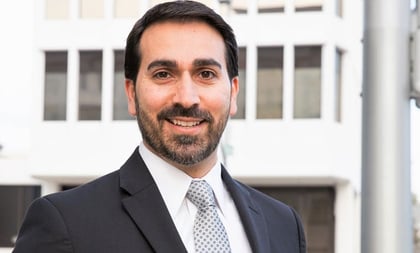Alex Chalekian was a social media influencer even before the RIA drove change by tweeting a selfie-video chastising money manager Ken Fisher for making crude remarks in a talk at the 2019 Tiburon CEO Summit.
But when the provocative tweet went viral and mainstream media picked up the story, the economic fallout for Fisher proved just how much impact a social media communiqué can wield in the business world.
In an interview with ThinkAdvisor, Chalekian, founder and CEO of Lake Avenue Financial in Pasadena, California, cautions, however, that influencers need to “be careful not to fall victim to [social media]: You can almost put yourself in a prison when you feel, ‘My next tweet needs to be better than the last one.”
But that doesn’t motivate Chalekian, a 23-year financial services veteran who reluctantly carries the influencer moniker. He qualifies, however, if only by dint of his massive online following: 13,000-plus followers on Twitter, about 1,500 Facebook followers and 26,739 LinkedIn connections.
The advisor, 44, devotes an hour daily to social media activity, including time on FinTwit, the financial community on Twitter. Four years ago, he dove into social media with the chief goal of driving traffic to his firm’s website. Indeed, he saw a significant increase in AUM as a result and now manages client assets of $185 million.
In the interview, Chalekian, also head of practice acquisition at Integrated Partners, continues to advocate for industry improvement. Financial services has “a poor standard for acceptable behavior” on several fronts, and there’s “widespread concern about it. Industry leaders need to step up,” he argues.
After the ruckus he kicked up in fall 2019, some conference organizers made certain policy changes governing attendees’ behavior. But the pandemic put the kibosh on such in-person gatherings — for a while, at least.
Soon after Chalekian Twitter-voiced his disgust at Fisher’s remarks “about genitalia” and “tripping on acid,” for example, which, he said, were “absolutely horrifying,” approximately $3.4 billion in assets — mostly belonging to public pension groups — were withdrawn from Fisher Investments.
(Many of those pension funds later removed Fisher Investments from their watch lists.)
Earlier, Fisher issued an apology for “some of the words and phrases [he] used” but contended that Chalekian had “certainly misconstrued [his] intended meaning.”
As a consequence of the affair, Fisher was barred from future Tiburon CEO Summits for making inappropriate remarks.
A native of Los Angeles and son of a jeweler and school teacher, Chalekian worked at SunAmerica and American Express Advisors before founding his own advisory firm in 2003. Eleven years later, he revamped his business model, putting the accent on financial planning, and launched Lake Avenue Financial.
Ever the outspoken critic, he is now advocating for the industry to end the use of assets under management as the best measure of an advisor’s success but to more fully recognize financial planners’ work and evaluate books of business according to revenues instead.
As for the influencer’s digital media efforts for his own clients, the RIA has built a studio to record videos for them; and this year he plans to treat them to a virtual wine tasting, complete with a sommelier, as well as a cooking show helmed by a professional chef.
His affinity for social media is doubtless an offshoot of his longtime interest in technology, which is reflected in the winning stocks he susses out before they show up on most folks’ radar screens. In the interview, he names two of his favorites and and ETF for this year.
ThinkAdvisor recently spoke with Chalekian, who was on the phone from Pasadena. The uproar generated by his fiery tweet, which called for changes in conference behavior, has subsided; but, he says: “Hopefully, when things get back to normal, we can make sure we push forward in making this a much better industry for everyone.
The last thing I want is to get back to where we started from with people getting drunk and being obnoxious.”
Here are excerpts from our interview:
THINKADVISOR: What’s your secret to using social media to help you as a financial advisor?
ALEX CHALEKIAN: Social media is woven into the fabric of our lives. It takes time, and you have to be able to build a following. I have an hour every day in my calendar [earmarked] to focus on social media — posting something online; [developing] ideas that pop into my head, which I post as well; responding to tweets. But you have to be careful with social media. It can consume you.
What do you mean?
You have to be careful not to fall victim to it. There are a lot of bad actors out there. Also, you can almost put yourself in this prison where you feel, “My next tweet has to be better than the last one.” I don’t fall victim to that, but I see it happening with a lot of quote-unquote social media influencers, and I feel bad for them, honestly.
People display their personalities online, which can bring either good or bad results, right?
Yes, exactly. As I say, you have to be careful. It’s important for people to understand why they’re on social media. For example, Twitter [offers] FinTwit [Financial Twitter for the investing community].
What’s the biggest benefit for FAs?
It’s great for you to be able to connect there with colleagues, especially in this day and age with the pandemic: We don’t have our happy hours anymore; we don’t have our networking groups. So being able to connect with [the financial community] online is fantastic.
Do you and others also use FinTwit for answering business questions?
Yes. You can ask about specifics. Today someone was asking, “What cloud service do you use to securely store your clients’ documents?” People were chiming in. So there’s a lot of [such] benefits if you want to be part of that community.
What’s another way that financial advisors use Twitter?
You can be the jokester putting up memes and things like that all day long. It’s interesting; but I see a lot of people, advisors especially, who are just constantly trying to be funny online to get attention through social media. I feel it’s consuming them to the point where I wonder if they ever get any work done — or if they’re just on Twitter all day long!
What else have you observed on FinTwit?
There are anonymous accounts that are just trying to do nothing but joke around. But even though they’re not disclosing who they are, you can tell from the writing that they’re people within the industry because they know what they’re talking about.
After you heard Ken Fisher give a “fireside chat” laced with off-color comments at Tiburon’s 2019 CEO Summit, you video-tweeted your “horrified and disgusted” reaction, adding that “many women” told you such “inappropriate comments was one of the reasons they don’t like coming to these conferences. It makes them feel very uncomfortable. We need to change this. We need to change it now.” What are your thoughts today about that tweet?
People who know me know I have a very hard time staying quiet: If I see something wrong, I’m going to discuss it. It’s the type of thing like, if you see something, say something.
So you mean that it’s in your nature?
The financial industry historically has a poor standard for acceptable behavior, diversity, equity, representation and compensation. That’s, kind of, what prompted me to speak up. There’s concern among the industry — and it’s widespread. I wasn’t trying to specifically point out [Fisher] or badmouth him. I wasn’t trying to single out an individual.
How did your tweet help the industry, especially female advisors?









 February 10, 2021 at 03:56 PM
February 10, 2021 at 03:56 PM











